本ホームページは「JavaScript」が使われております。 「JavaScript」をONにしてご利用ください。
Embassy of Japan in the United States of America

Visa and Travel Information

- If you need a visa, check how and when you can apply for a visa: General Rules & Processing Time
- If you do NOT need a visa, skip to STEP #6 .

Visa Information
Who needs a visa.
- The Visa Waiver Program applies based on your nationality, NOT on your U.S. residence status (including green card).
Back to Top
General Rules for Visa Application
Application procedure & processing time.
- In general, it takes 5 business days to issue a visa. (ex., If you apply on Monday, you can pick up a visa next Monday. Our holidays are not counted as business days.)
- It may take more than one month depending on the visa. We recommend that you apply for a visa approximately 1.5 months before your departure date. We do NOT have expedited services.

Types of Visas & Application Documents
- Please click on the applicable box below to see application documents on each visa.
- If you intend to stay in Japan more than 90 days, please click on the "COE Holders" box.
- The online application for a short-term tourism visa ( single entry only, and only for the purpose of tourism ) is available. For further information, please click on the “Short-term Tourism/Business/Study” box below.
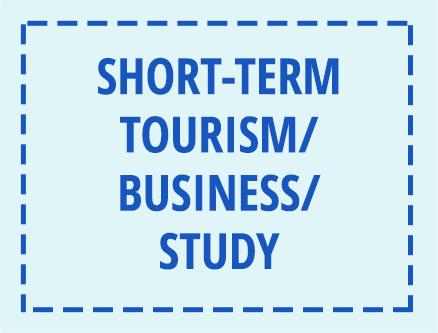
Application drop-off/pick-up & payment Hours
- No appointment required.
- No parking available.
- Please check our holidays before visiting.
- In case of adverse weather conditions, Embassy of Japan follows the guideline of U.S. Federal Government. When the U.S. Office of Personnel Management (OPM) announces federal agencies in the Washington, D.C. area are "closed" or "delayed", Embassy of Japan along with VISA section will be closed/delayed accordingly.
- The Embassy will NOT accept any applications by mail.
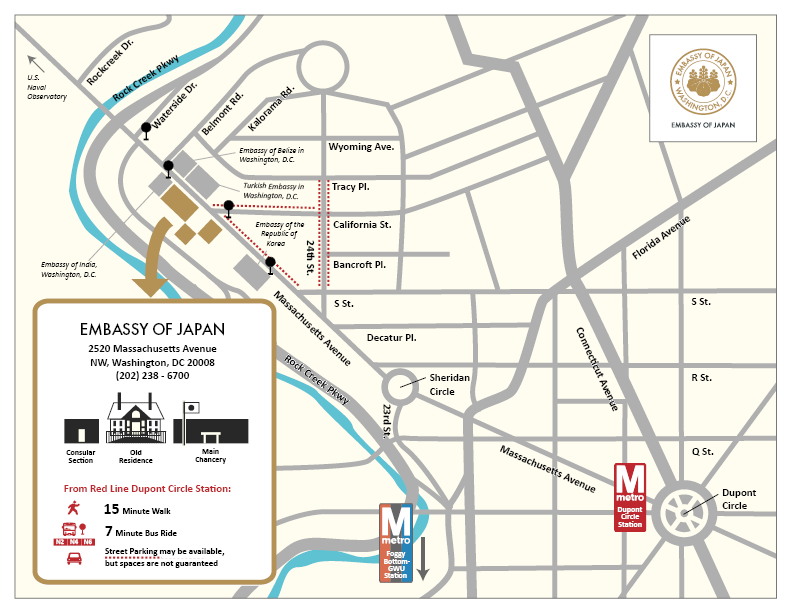
- US citizens are exempt from visa fees. (Some countries and regions are also exempt from visa fees. Please check the Visa Fee Exempt list to find out if your visa fee is waived. )
- Applicants who have applied for a visa online are required to bring a printed copy of “Registration Information Form” to the Embassy for your payment (payment is only acceptable in the afternoon). *Applicants who has applied for evisa (online visa) on or after 10th July are eligible for online payment ( Details / Video ).
- We accept CASH only. We DO NOT accept personal checks and credit cards.
Information on Border Measures
Covid-19 travel guidelines.
- On-arrival surveillance for travelers and returnees with COVID-19 symptoms has been conducted since 12:00 am (JST) on May 8, 2023.
- Insurance Before Entrance
- Guidebook for when you are feeling ill
Visiting Japan
- After April 29, 2023, pre-registration for quarantine procedures on Visit Japan Web are no longer required, however, you can still use Visit Japan Web to pre-register for "Immigration", "Customs" and "Tax-free Shopping Service" (Optional).
- For information about traveling with minor(s), please read our FAQ .

Staying in Japan
- Be aware of traffic rules in Japan
- Nice to Meet You! Let's Be Friends!
- Study in Japan
- Japanese pension law
- Information on Local Call Centers
- It is a CRIME to sell or give a bank account without just cause.
- Roadmap for the Realization of a Society of Harmonious Coexistence with Foreign Nationals
- Comprehensive Measures for Acceptance and Coexistence of Foreign Nationals
- A daily life support portal for foreign nationals
- Guidebook on Living and Working
- New to Japan? Useful pages for foreign nationals

Recommended Information
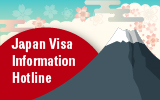
- Consular Section: Embassy of Japan, 2520 Massachusetts Ave. NW, Washington, DC 20008
- Office Hours: Application Drop-off/ M-F 9:15am-12:00pm Visa Pick-up/ M-F 1:30pm-4:00pm
- Contact Us: 202-238-6800/ M-F 9:00am-5:00pm
- Japan Visa Information Hotline (Available in English/Vietnamese/Russian/Ukrainian) 1-202-499-1468 Domestic call fee applies, 24hours, 7days/week
Security Alert May 17, 2024
Worldwide caution, update may 10, 2024, information for u.s. citizens in the middle east.
- Travel Advisories |
- Contact Us |
- MyTravelGov |
Find U.S. Embassies & Consulates
Travel.state.gov, congressional liaison, special issuance agency, u.s. passports, international travel, intercountry adoption, international parental child abduction, records and authentications, popular links, travel advisories, mytravelgov, stay connected, legal resources, legal information, info for u.s. law enforcement, replace or certify documents.
Share this page:
Japan Travel Advisory
Travel advisory january 8, 2024, japan - level 1: exercise normal precautions.
Japan – Level 1: Exercise Normal Precautions
Reissued after periodic review without changes.
Exercise normal precautions in Japan.
Read the country information page for additional information on travel to Japan.
If you decide to travel to Japan:
- Enroll in the Smart Traveler Enrollment Program (STEP) to receive Alerts and make it easier to locate you in an emergency.
- Follow the Department of State on Facebook and Twitter .
- Follow Embassy Tokyo’s American Citizen Services section on Facebook and Twitter .
- Review the Country Security Report for Japan.
- Visit the CDC page for the latest Travel Health Information related to your travel.
- Prepare a contingency plan for emergency situations. Review the Traveler’s Checklist .
Travel Advisory Levels
Assistance for u.s. citizens, search for travel advisories, external link.
You are about to leave travel.state.gov for an external website that is not maintained by the U.S. Department of State.
Links to external websites are provided as a convenience and should not be construed as an endorsement by the U.S. Department of State of the views or products contained therein. If you wish to remain on travel.state.gov, click the "cancel" message.
You are about to visit:
Entering Japan
Below is a basic introduction to the Japanese immigration system. Contact your closest Japanese embassy or consulate outside Japan or an immigration bureau inside Japan for official advice.
All foreigners, including foreign residents, get fingerprinted and photographed upon entering Japan as a measure aimed at preventing terrorism and other illegal activities. Excluded from this procedure are persons under the age of 16 and a few special groups, such as diplomats and visiting dignitaries.
All foreigners receive a status of residence when entering Japan. There are more than twenty statuses of residence, including "temporary visitor" for tourists, and a range of statuses for students , workers and relatives of Japanese nationals and residents.
If you are a citizen of one of the over 50 countries with which Japan has a "general visa exemption arrangement", you need only a valid passport to enter Japan as a "temporary visitor". Otherwise, you need to obtain a visa before entering the country. Temporary visitors from most countries are allowed to stay for up to 90 days.
If you are a citizen of Austria, Germany, Ireland, Liechtenstein, Mexico, Switzerland or the United Kingdom, you have the possibility to extend your stay to a total of up to six months. You still initially enter Japan on a 90 day permit, but can then apply for an extension at an immigration bureau in Japan.
Visitors to Japan are encouraged to use Visit Japan Web to digitally submit immigration and customs-related information ahead of their arrival for a smoother entry into the country without the need to fill out paper forms. The system can be used to also create a tax exemption QR code for an enhanced tax-free shopping experience.
Temporary visitors are not allowed to engage in any paid activities. However, short term studies at Japanese language schools are permitted.
All foreign tourists in Japan are required to carry their passports with them at all times.
Longer stays for the wealthy and digital nomads
If you are a citizen of one of the over 50 countries with which Japan has a "general visa exemption arrangement" and have savings of over 30 million yen, you and your spouse may qualify to stay in Japan for up to one year for the purpose of sightseeing and recreation. Likewise, professionals with an annual income of over 10 million yen may qualify to work remotely from Japan for up to six months. Respective visas (for "long-term residents for sightseeing/recreation" or "digital nomads") have to be obtained before traveling to Japan.
White-collar work
Foreigners who wish to work in Japan need to get a work visa from a Japanese embassy or consulate outside of Japan to enter the country on a status of residence permitting work.
There are over a dozen such statuses of residence, each allowing the holder to work only in a specific professional field, for example, journalism, arts, research, education, engineering, entertainment, business management, international services, etc. If you change jobs while you are in Japan and your new job falls into a different professional field (e.g. from education to engineering), you will need to change your status of residence.
A university degree or considerable professional experience in the applicable field is required to qualify for most work visa types. Most also require you to have a prospective employer as a sponsor. Residence permission is granted in periods of 4 months to 5 years and is extendable.
Workers may bring their spouses and children to Japan on a dependent visa. Dependents are not allowed to engage in any paid activities unless they get permission from the immigration office, but even then, they may work only a set maximum number of hours per week.
Other work and trainees
The so-called "Specified Skills" status allows for work in one of over a dozen professional fields, including construction, hospitality, nursing and manufacturing. Applicants do not need a degree but have to pass a technical skills test and know some Japanese. There are two types: Type 1 allows workers to stay in Japan for up to five years, but they may not bring their family. Type 2 is for more highly qualified workers, can be extended indefinitely and allows for the family to live in Japan. Type 1 holders may upgrade to type 2 after five years.
Furthermore, there is the "Technical Intern Training Program", which lets foreign workers acquire skills at a workplace in Japan that they could not otherwise acquire in their home countries. After a few years, participants become eligible to switch to the above-mentioned "Specified Skill" type 1 status. Most trainees come from South East Asia.
Working holidays
This is a special visa type that allows some paid activity for citizens of Australia, Canada, Denmark, Germany, France, Ireland, Korea, New Zealand, the United Kingdom and a few other countries between the ages of 18 and 30. Consult the working holiday visa page for details.
Foreigners who wish to study in Japan (except for short term studies at language schools ) need to get a student visa at a Japanese embassy or consulate outside of Japan in order to enter the country on a status of residence that permits long term studies.
Sponsorship from an educational institution in Japan and proof of sufficient funds to cover all your expenses during your stay are required to qualify for a student visa. Residence permission is granted in periods of between 3 months and 4 years and 3 months and is extendable.
Students must not engage in paid activities unless they get permission from the immigration office. Even then, students may work only a set maximum number of hours per week.
Foreigners who are married to a Japanese national or to a permanent resident of Japan can obtain a spouse visa, which allows them to engage in any paid activity in Japan. Residence permission is granted in periods of 6 months or 1, 3 or 5 years and is extendable.
Staying in Japan
Inside Japan, most immigration-related matters, such as extending residence permission or changing the status of residence, are handled by the Immigration Services Agency, which has bureaus across the country.
Residence card
All new foreign residents are issued a residence card upon initially entering Japan at Narita , Haneda , Kansai or Chubu airports. New residents arriving through different ports can get their cards at their municipal offices.
The residence card is an important document required for opening a bank account , obtaining a cell phone , converting a drivers license and similar activities. It stores the holder's personal information, including the current address, the status of residence and period of stay. Foreign residents are required to carry their residence card with them at all times.
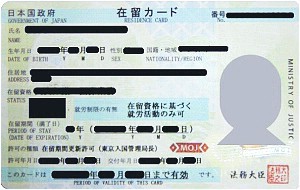
Extending residence permission
Most statuses of residence allow you to stay in Japan for a period between three months and five years. If you wish to stay longer, you must apply for an extension at an immigration bureau inside Japan before the expiry date of your current residence permission.
The application process is relatively simple, provided that you still fulfill the conditions for the specific status of residence. It typically takes a couple of days or weeks for the application to be processed, and you are allowed to remain in Japan during that time even if your previous residence permission expires in the meantime.
Changing status of residence
It is possible to change your status of residence (e.g. from instructor to arts or from student to engineer) at an immigration bureau inside Japan. You will have to provide similar documentation as you would when applying for a new status of residence at an embassy or consulate outside of Japan.
Re-entry permits
Foreign residents who wish to temporarily leave Japan for longer than a year, need to get a re-entry permit before departing Japan; otherwise, they lose their status of residence. Re-entry permits can be obtained at immigration offices in Japan. For absences of less than one year, re-entry permits are not required.
Permanent residence
Foreign residents, who have shown good conduct and have sufficient assets or ability to make an independent living, can be granted permanent residence if they reside in Japan for a certain number of consecutive years. For highly-skilled professionals and spouses of Japanese nationals, the minimum amount of years is typically one to five years, while for others it is typically ten years. Permanent residence status is indefinite and allows for any paid activity.
Naturalization
Foreigners, who have resided in Japan for at least five consecutive years (less if married to a Japanese national), have shown good conduct, have never plotted against the Japanese government, have sufficient assets or ability to make an independent living and are willing to renounce any other citizenship held, can be granted Japanese citizenship.
Questions? Ask in our forum .
Links and Resources
A guide to japanese visas, japan customs, guide to the animal quarantine service, the ministry of foreign affairs, immigration services agency of japan.

Japan Travel Restrictions
Traveler's COVID-19 vaccination status
Traveling from the United States to Japan
Open for vaccinated visitors
COVID-19 testing
Not required
Not required for vaccinated visitors
Restaurants
Recommended in public spaces.
Entry details & exceptions
Documents & additional resources, ready to travel, find flights to japan, find stays in japan, explore more countries on travel restrictions map, destinations you can travel to now, dominican republic, netherlands, philippines, puerto rico, switzerland, united arab emirates, united kingdom, know when to go.
Sign up for email alerts as countries begin to open - choose the destinations you're interested in so you're in the know.
Can I travel to Japan from the United States?
Most visitors from the United States, regardless of vaccination status, can enter Japan.
Can I travel to Japan if I am vaccinated?
Fully vaccinated visitors from the United States can enter Japan without restrictions.
Can I travel to Japan without being vaccinated?
Unvaccinated visitors from the United States can enter Japan without restrictions.
Do I need a COVID test to enter Japan?
Visitors from the United States are not required to present a negative COVID-19 PCR test or antigen result upon entering Japan.
Can I travel to Japan without quarantine?
Travelers from the United States are not required to quarantine.
Do I need to wear a mask in Japan?
Mask usage in Japan is recommended in public spaces.
Are the restaurants and bars open in Japan?
Restaurants in Japan are open. Bars in Japan are .

Ultimate Guide: How to Travel to Japan from the US
Planning a trip to Japan from the US can be an exciting and rewarding experience. The Land of the Rising Sun offers a unique blend of ancient traditions and modern marvels, making it a must-visit destination for travelers. Whether you’re interested in exploring historic temples, indulging in delicious cuisine, or experiencing the bustling city life, Japan has something for everyone. In this ultimate guide, we will provide you with all the information you need to plan your trip to Japan from the US.
Best time to plan your trip
When it comes to visiting Japan, timing is everything. The country experiences four distinct seasons, each offering its own unique charm. The best time to plan your trip depends on your preferences and the activities you wish to partake in.
1. Spring (March to May): Spring is a popular time to visit Japan, especially for cherry blossom enthusiasts. The sakura season usually begins in late March and lasts until early April. This is when cherry trees bloom, creating a stunning pink landscape.
2. Summer (June to August): Summer in Japan is hot and humid, but it’s also a great time to explore the country’s beautiful beaches and enjoy outdoor festivals. Just be prepared for the occasional typhoon.
3. Autumn (September to November): Fall is another picturesque season in Japan, with vibrant autumn foliage. It’s an ideal time for nature lovers and hikers, as the weather is mild and pleasant.
4. Winter (December to February): If you’re a fan of winter sports or want to experience the magic of snow-covered landscapes, then winter is the best time to visit Japan. The country offers excellent skiing and snowboarding opportunities.
Visa requirements for US citizens
Before traveling to Japan, US citizens need to ensure they have the necessary travel documents, including a valid passport and a visa. Fortunately, Japan offers a visa waiver program for US citizens, allowing them to stay in the country for up to 90 days without a visa.
Here are the key requirements for US citizens:
- A valid US passport with at least six months of validity remaining
- A return or onward ticket
- Evidence of sufficient funds to cover your stay
- No criminal record
It’s important to note that the visa requirements may change, so it’s always a good idea to check the official website of the Embassy of Japan for the most up-to-date information.
Top destinations to visit in Japan
Japan is a country full of diverse and captivating destinations. Here are some of the top places you should consider visiting:
- Tokyo: The bustling capital city offers a mix of tradition and modernity. Explore historic temples, visit high-tech neighborhoods, and indulge in delicious street food.
- Kyoto: Known for its numerous UNESCO World Heritage sites, Kyoto is a must-visit destination for history buffs. Explore ancient temples, traditional gardens, and immerse yourself in Japanese culture.
- Osaka: Famous for its vibrant food scene, Osaka is a culinary paradise. Don’t miss trying local specialties like takoyaki and okonomiyaki.
- Hiroshima: Visit the Peace Memorial Park and Museum to learn about the tragic history of Hiroshima. It’s a powerful and moving experience.
- Hokkaido: If you’re a nature lover, Hokkaido is the perfect destination. Explore national parks, go hiking, and indulge in fresh seafood.
- Nara: Home to friendly deer and ancient temples, Nara is a great day trip from Kyoto or Osaka.
Local customs and etiquette to know
When traveling to Japan, it’s important to familiarize yourself with the local customs and etiquette. Here are a few key points to keep in mind:
- Bowing: Bowing is a common form of greeting in Japan. The depth of the bow depends on the situation, but a slight nod of the head is usually sufficient for casual encounters.
- Shoes: In Japan, it’s customary to remove your shoes before entering homes, traditional restaurants, and some temples. Look for shoe racks or follow the lead of locals.
- Public transportation: Keep your voice low and avoid talking on your phone while using public transportation. It’s also polite to give up your seat to elderly or disabled individuals.
- Onsen etiquette: If you plan to visit a traditional Japanese hot spring or onsen, make sure to follow the bathing etiquette, such as washing yourself thoroughly before entering the bath.
Transportation options within Japan
Japan has an extensive and efficient transportation system, making it easy to get around the country. Here are some popular transportation options:
- Shinkansen (Bullet Train): The Shinkansen is a high-speed train network that connects major cities in Japan. It’s a convenient and comfortable way to travel long distances.
- Local trains: Japan’s local train network is well-developed and reliable. It’s a cost-effective option for shorter distances and exploring within cities.
- Metro: Major cities like Tokyo and Osaka have extensive metro systems. They are efficient and can take you to popular tourist attractions.
- Buses: Buses are a convenient option for traveling to remote areas or smaller towns not serviced by trains. They are also a good choice for day trips.
Must-try Japanese cuisine
No trip to Japan is complete without indulging in the country’s delicious cuisine. Here are some must-try dishes:
- Sushi: Fresh and flavorful, sushi is a quintessential Japanese dish. Try a variety of nigiri, maki rolls, and sashimi.
- Ramen: Japan’s beloved noodle soup dish comes in various styles, such as shoyu, miso, and tonkotsu. Each region has its own unique flavors.
- Takoyaki: These savory octopus balls are a popular street food in Japan. They are crispy on the outside and soft on the inside.
- Tempura: Tempura consists of lightly battered and deep-fried seafood or vegetables. It’s often served with a dipping sauce.
- Matcha: Matcha is a powdered green tea used in traditional tea ceremonies. Try matcha-flavored sweets and beverages.
Frequently Asked Questions about travel to Japan from the US
Q: Do I need a visa to travel to Japan from the US?
A: US citizens can stay in Japan for up to 90 days without a visa under the visa waiver program. However, it’s important to have a valid passport and meet other entry requirements.
Q: What is the best time to visit Japan from the US?
A: The best time to visit Japan depends on your preferences. Spring (March to May) and autumn (September to November) are popular for pleasant weather and beautiful scenery. Summer offers outdoor festivals, while winter is ideal for winter sports.
Q: How long does it take to travel from the US to Japan?
A: The duration of the flight from the US to Japan depends on the departure and arrival cities. On average, it takes around 12-14 hours for a direct flight.
Q: Is it safe to travel to Japan?
A: Japan is generally considered a safe country for travelers. However, it’s always important to take common-sense precautions, such as keeping an eye on your belongings and being aware of your surroundings.
Expert Advice
When traveling to Japan from the US, it’s essential to plan ahead and make the most of your trip. Here are some expert tips:
- Learn a few basic Japanese phrases to enhance your travel experience and show respect to the locals.
- Research and book accommodations in advance, especially during peak travel seasons.
- Try to immerse yourself in the local culture by participating in traditional activities like tea ceremonies or wearing a kimono.
- Don’t forget to pack comfortable shoes, as you’ll be doing a lot of walking and exploring in Japan.
- Consider purchasing a Japan Rail Pass if you plan to travel extensively within the country. It offers unlimited travel on JR trains, including the Shinkansen.
With this ultimate guide and expert advice, you’re now equipped to plan your trip to Japan from the US. Whether you’re exploring the vibrant streets of Tokyo, admiring the beauty of Kyoto’s temples, or savoring delicious local cuisine, Japan promises an unforgettable experience.
Izumi Kenta
Hi, I’m Izumi Kenta from Japan. By profession, I worked as a tourist guide and interpreter in Japan. Besides this profession, I’m a hobbyist blogger. I love to talk about different things about Japan and share them with a wider audience who wants to know about my country. To share my thoughts, I’ve created this site Visitjapan and brought some Japanese travel enthusiasts and tourists worldwide to share their experiences.
Leave a Reply Cancel reply
Your email address will not be published. Required fields are marked *
Save my name and email in this browser for the next time I comment.

Recent Posts
Why Does Japan Have So Many Earthquakes? Discovering the Secrets Behind Japan's Seismic Activity
Japan is a country that is known for its frequent earthquakes. The question of why Japan experiences so many earthquakes has intrigued scientists and researchers for years. In this article, we will...
Unlocking the Secrets: Kobe Beef Price per kg Revealed!
Unlocking the Secrets: Kobe Beef Price per kg Revealed! Understanding the Factors Affecting Kobe Beef Price per kg Kobe beef, renowned for its exceptional quality and flavor, is a delicacy that...

The Ministry of Foreign Affairs website uses JavaScript. Please turn on "JavaScript" and use it.

The JAPAN eVISA system (electronic visa)
Foreign nationals/people who wish to travel to Japan for tourism for a short-term period can apply for a visa online and receive an electronic visa (eVISA) through the JAPAN eVISA system. As of April 26, 2024, the JAPAN eVISA system is available for nationals/people residing in the following countries/regions.
Eligibility
- (note) Online visa application via the JAPAN eVISA system is currently not available at the Consulate-General of Japan in Dubai.
- (1) China Nationals of China, who reside in China
- (2) Viet Nam Nationals of Viet Nam, who reside in Viet Nam and participate in a packaged tour organized by designated travel agencies
- (3) Hong Kong, India, Indonesia, Macau, Mongolia and the Republic of Korea All foreign nationals/people residing in Hong Kong, India, Indonesia, Macau, Mongolia and the Republic of Korea (except jurisdiction over the Consulate General of Japan in Jeju), except those who are exempt from short-term visa
- (1) JAPAN eVISA is available only to those who travel to Japan by plane.
- (2) During the application process, the applicant may be requested to appear in person at the Japanese overseas establishment with jurisdiction over the place of the applicant’s residence for an interview.
- (3) Only ordinary passport holder is eligible to apply through JAPAN eVISA website.
Types of visa
Single-entry short-term stay visa for the purpose of Tourism (for a period of up to 90 days) (Note). Electronic visas will be issued to those who applied through JAPAN eVISA website.
(Note: For nationals of China residing in China, electronic visas with a period of stay "15 days" or "30 days" will be issued. For nationals of Viet Nam residing in Viet Nam, the period of stay of electronic visas will be "15 days".) (Travelers with eVISA are required to display “Visa issuance notice” at the airport in the internet environment. PDF data, screenshot and printed copy will not be accepted.) If you wish to visit Japan for other purposes or for a long-term stay, please submit your application to the Japanese Embassy, Consulate General or Consular office with jurisdiction over your place of residence. (In some countries, applications must be made through travel agencies accredited by Japanese overseas establishment.) (For Taiwan, Taipei / Kaohsiung offices of Japan-Taiwan Exchange Association) In this case, you will have a visa sticker on your passport.
JAPAN eVISA website

- Please beware of fraud websites looking alike the JAPAN eVISA website.
- If your application is incomplete, we will cancel it without processing. Once cancelled, you are supposed to reapply (for your visa). Entering incorrect information and/or uploading incomplete/wrong documents could lead to a delay in examination or cancellation of your eVISA application, which may affect your travel plans.
How to display “Visa issuance notice”
Frequently asked questions about japan evisa.
- FAQ about JAPAN eVISA
Contact information for inquiries
Japan Visa Information Hotline: [email protected] (Available language: English) (Note1) Please mention your nationality or citizenship and place of your residence in your email. (Note2) This e-mail address is only for inquiries about JAPAN eVISA application procedures. For general inquiries, please contact the Japanese overseas establishment with jurisdiction over your place of residence.
- Website of Japanese Embassies and Consulates

- Get a Passport
- Renew a Passport
- Get a Passport Fast
- Courier Services
- Passport Information
Japan Entry Requirements - Required Travel Documents for Travel to Japan
Home » Passports » How to Obtain a U.S. Passport
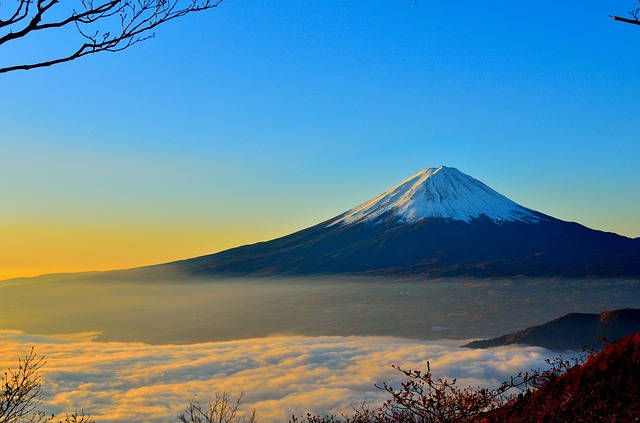
Get the Latest Updates

You’ll Need a Visa to Enter Japan Now
In addition to numerous strict conditions for entering japan, visa-free travel from the u.s. is currently suspended..
- Copy Link copied

Japan has technically reopened to foreign tourists but it takes a lot to get there—including a visa.
Photo by Shutterstock
As of June 10, Japan reopened to travelers from 98 countries, including the United States, but with a whole host of specific conditions—including the need for a visa.
Prior to closing its international borders in 2020 due to the pandemic, Japan had exempted U.S. travelers from the need to obtain a visa for entering the country for leisure travel. But that exemption has now been suspended, according to Japan’s Ministry of Foreign Affairs .
“Currently, foreign nationals/people who are willing to enter Japan need a visa newly issued by embassies or consulates or consular office of Japan,” the foreign ministry stated in its latest update about entry requirements.
So, if you’re thinking of heading to Japan, you will need to make an appointment at the closest Japanese embassy or consulate or apply for a visa by mail. Be aware that some Japanese embassies and consulates might have a backlog of visa applications to process and it could take longer than usual to obtain one.
“Due to the tremendous amount of visa applications we are processing, we cannot provide you with any status updates,” stated the Consulate-General of Japan in San Francisco on its website.
The need to obtain a visa is in addition to several more hurdles travelers must cross to get into Japan. Earlier this month, Japanese authorities outlined the new rules for foreign travelers, and they include obtaining private medical insurance that covers medical expenses related to COVID-19 infection, wearing a mask at all times unless there is a specific exception, and traveling under the supervision of an organized tour group.
Japan’s reopening plan divides countries and regions into red, yellow, or blue categories depending on COVID-19 risk. People from countries in the blue category (such as the United States) will be able to bypass quarantine as long as they pass a predeparture COVID test, regardless of vaccination status. Those in the yellow category (which includes such countries as India, Lebanon, and Portugal) will also be able to skip a quarantine period with proof of vaccination. However, visitors from the red group—which consists of Pakistan, Fiji, Albania, and Sierra Leone—must take an on-arrival test and quarantine for a period of time.
With the easing of entry restrictions, Japan also increased its daily entry limits from 10,000 foreign arrivals to 20,000 per day in June—still a fraction of the 31.88 million foreign tourists (or an average of 87,000 tourists per day) who entered Japan in 2019.
>> Next: Singapore Drops COVID Test for Vaccinated Travelers

You are using an outdated browser. Upgrade your browser today or install Google Chrome Frame to better experience this site.
Japan Traveler View
Travel health notices, vaccines and medicines, non-vaccine-preventable diseases, stay healthy and safe.
- Packing List
After Your Trip
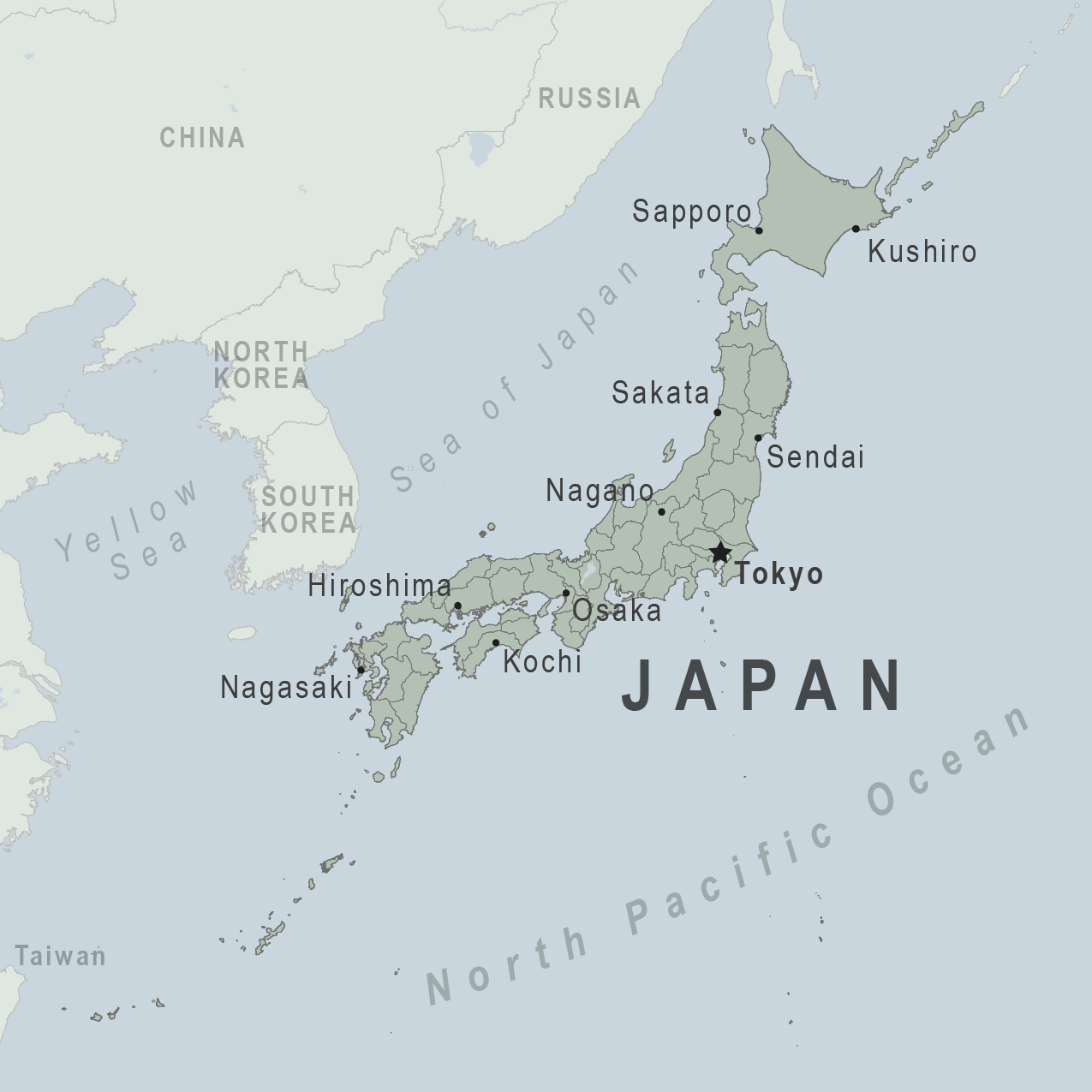
There are no notices currently in effect for Japan.
⇧ Top
Check the vaccines and medicines list and visit your doctor at least a month before your trip to get vaccines or medicines you may need. If you or your doctor need help finding a location that provides certain vaccines or medicines, visit the Find a Clinic page.
Routine vaccines
Recommendations.
Make sure you are up-to-date on all routine vaccines before every trip. Some of these vaccines include
- Chickenpox (Varicella)
- Diphtheria-Tetanus-Pertussis
- Flu (influenza)
- Measles-Mumps-Rubella (MMR)
Immunization schedules
All eligible travelers should be up to date with their COVID-19 vaccines. Please see Your COVID-19 Vaccination for more information.
COVID-19 vaccine
Hepatitis A
Consider hepatitis A vaccination for most travelers. It is recommended for travelers who will be doing higher risk activities, such as visiting smaller cities, villages, or rural areas where a traveler might get infected through food or water. It is recommended for travelers who plan on eating street food.
Hepatitis A - CDC Yellow Book
Dosing info - Hep A
Hepatitis B
Recommended for unvaccinated travelers younger than 60 years old traveling to Japan. Unvaccinated travelers 60 years and older may get vaccinated before traveling to Japan.
Hepatitis B - CDC Yellow Book
Dosing info - Hep B
Japanese Encephalitis
Recommended for travelers who
- Are moving to an area with Japanese encephalitis to live
- Spend long periods of time, such as a month or more, in areas with Japanese encephalitis
- Frequently travel to areas with Japanese encephalitis
Consider vaccination for travelers
- Spending less than a month in areas with Japanese encephalitis but will be doing activities that increase risk of infection, such as visiting rural areas, hiking or camping, or staying in places without air conditioning, screens, or bed nets
- Going to areas with Japanese encephalitis who are uncertain of their activities or how long they will be there
Not recommended for travelers planning short-term travel to urban areas or travel to areas with no clear Japanese encephalitis season.
Japanese encephalitis - CDC Yellow Book
Japanese Encephalitis Vaccine for US Children
Cases of measles are on the rise worldwide. Travelers are at risk of measles if they have not been fully vaccinated at least two weeks prior to departure, or have not had measles in the past, and travel internationally to areas where measles is spreading.
All international travelers should be fully vaccinated against measles with the measles-mumps-rubella (MMR) vaccine, including an early dose for infants 6–11 months, according to CDC’s measles vaccination recommendations for international travel .
Measles (Rubeola) - CDC Yellow Book
Dogs infected with rabies are not commonly found in Japan.
If rabies exposures occur while in Japan, rabies vaccines are typically available throughout most of the country.
Rabies pre-exposure vaccination considerations include whether travelers 1) will be performing occupational or recreational activities that increase risk for exposure to potentially rabid animals and 2) might have difficulty getting prompt access to safe post-exposure prophylaxis.
Please consult with a healthcare provider to determine whether you should receive pre-exposure vaccination before travel.
For more information, see country rabies status assessments .
Rabies - CDC Yellow Book
Tick-borne Encephalitis
Avoid bug bites
Learn more about tick-borne encephalitis at your destination .
Tick-borne Encephalitis - CDC Yellow Book
Avoid contaminated water
Leptospirosis
How most people get sick (most common modes of transmission)
- Touching urine or other body fluids from an animal infected with leptospirosis
- Swimming or wading in urine-contaminated fresh water, or contact with urine-contaminated mud
- Drinking water or eating food contaminated with animal urine
- Avoid contaminated water and soil
Clinical Guidance
Airborne & droplet, avian/bird flu.
- Being around, touching, or working with infected poultry, such as visiting poultry farms or live-animal markets
- Avoid domestic and wild poultry
- Breathing in air or accidentally eating food contaminated with the urine, droppings, or saliva of infected rodents
- Bite from an infected rodent
- Less commonly, being around someone sick with hantavirus (only occurs with Andes virus)
- Avoid rodents and areas where they live
- Avoid sick people
Tuberculosis (TB)
- Breathe in TB bacteria that is in the air from an infected and contagious person coughing, speaking, or singing.
Learn actions you can take to stay healthy and safe on your trip. Vaccines cannot protect you from many diseases in Japan, so your behaviors are important.
Eat and drink safely
Food and water standards around the world vary based on the destination. Standards may also differ within a country and risk may change depending on activity type (e.g., hiking versus business trip). You can learn more about safe food and drink choices when traveling by accessing the resources below.
- Choose Safe Food and Drinks When Traveling
- Water Treatment Options When Hiking, Camping or Traveling
- Global Water, Sanitation and Hygiene | Healthy Water
- Avoid Contaminated Water During Travel
You can also visit the Department of State Country Information Pages for additional information about food and water safety.
Prevent bug bites
Although Japan is an industrialized country, bug bites here can still spread diseases. Just as you would in the United States, try to avoid bug bites while spending time outside or in wooded areas.
What can I do to prevent bug bites?
- Cover exposed skin by wearing long-sleeved shirts, long pants, and hats.
- Use an appropriate insect repellent (see below).
- Consider using permethrin-treated clothing and gear if spending a lot of time outside. Do not use permethrin directly on skin.
What type of insect repellent should I use?
- FOR PROTECTION AGAINST TICKS AND MOSQUITOES: Use a repellent that contains 20% or more DEET for protection that lasts up to several hours.
- Picaridin (also known as KBR 3023, Bayrepel, and icaridin)
- Oil of lemon eucalyptus (OLE) or para-menthane-diol (PMD)
- 2-undecanone
- Always use insect repellent as directed.
What should I do if I am bitten by bugs?
- Avoid scratching bug bites, and apply hydrocortisone cream or calamine lotion to reduce the itching.
- Check your entire body for ticks after outdoor activity. Be sure to remove ticks properly.
What can I do to avoid bed bugs?
Although bed bugs do not carry disease, they are an annoyance. See our information page about avoiding bug bites for some easy tips to avoid them. For more information on bed bugs, see Bed Bugs .
For more detailed information on avoiding bug bites, see Avoid Bug Bites .
Stay safe outdoors
If your travel plans in Japan include outdoor activities, take these steps to stay safe and healthy during your trip:
- Stay alert to changing weather conditions and adjust your plans if conditions become unsafe.
- Prepare for activities by wearing the right clothes and packing protective items, such as bug spray, sunscreen, and a basic first aid kit.
- Consider learning basic first aid and CPR before travel. Bring a travel health kit with items appropriate for your activities.
- If you are outside for many hours in the heat, eat salty snacks and drink water to stay hydrated and replace salt lost through sweating.
- Protect yourself from UV radiation : use sunscreen with an SPF of at least 15, wear protective clothing, and seek shade during the hottest time of day (10 a.m.–4 p.m.).
- Be especially careful during summer months and at high elevation. Because sunlight reflects off snow, sand, and water, sun exposure may be increased during activities like skiing, swimming, and sailing.
- Very cold temperatures can be dangerous. Dress in layers and cover heads, hands, and feet properly if you are visiting a cold location.
Stay safe around water
- Swim only in designated swimming areas. Obey lifeguards and warning flags on beaches.
- Do not dive into shallow water.
- Avoid swallowing water when swimming. Untreated water can carry germs that make you sick.
- Practice safe boating—follow all boating safety laws, do not drink alcohol if you are driving a boat, and always wear a life jacket.
Keep away from animals
Most animals avoid people, but they may attack if they feel threatened, are protecting their young or territory, or if they are injured or ill. Animal bites and scratches can lead to serious diseases such as rabies.
Follow these tips to protect yourself:
- Do not touch or feed any animals you do not know.
- Do not allow animals to lick open wounds, and do not get animal saliva in your eyes or mouth.
- Avoid rodents and their urine and feces.
- Traveling pets should be supervised closely and not allowed to come in contact with local animals.
- If you wake in a room with a bat, seek medical care immediately. Bat bites may be hard to see.
All animals can pose a threat, but be extra careful around dogs, bats, monkeys, sea animals such as jellyfish, and snakes. If you are bitten or scratched by an animal, immediately:
- Wash the wound with soap and clean water.
- Go to a doctor right away.
- Tell your doctor about your injury when you get back to the United States.
Reduce your exposure to germs
Follow these tips to avoid getting sick or spreading illness to others while traveling:
- Wash your hands often, especially before eating.
- If soap and water aren’t available, clean hands with hand sanitizer (containing at least 60% alcohol).
- Don’t touch your eyes, nose, or mouth. If you need to touch your face, make sure your hands are clean.
- Cover your mouth and nose with a tissue or your sleeve (not your hands) when coughing or sneezing.
- Try to avoid contact with people who are sick.
- If you are sick, stay home or in your hotel room, unless you need medical care.
Avoid sharing body fluids
Diseases can be spread through body fluids, such as saliva, blood, vomit, and semen.
Protect yourself:
- Use latex condoms correctly.
- Do not inject drugs.
- Limit alcohol consumption. People take more risks when intoxicated.
- Do not share needles or any devices that can break the skin. That includes needles for tattoos, piercings, and acupuncture.
- If you receive medical or dental care, make sure the equipment is disinfected or sanitized.
Know how to get medical care while traveling
Plan for how you will get health care during your trip, should the need arise:
- Carry a list of local doctors and hospitals at your destination.
- Review your health insurance plan to determine what medical services it would cover during your trip. Consider purchasing travel health and medical evacuation insurance for things your regular insurance will not cover.
- Carry a card that identifies, in the local language, your blood type, chronic conditions or serious allergies, and the generic names of any medicines you take.
- Bring copies of your prescriptions for medicine and for eye glasses and contact lenses.
- Some prescription drugs may be illegal in other countries. Call Japan’s embassy to verify that all of your prescription(s) are legal to bring with you.
- Bring all the medicines (including over-the-counter medicines) you think you might need during your trip, including extra in case of travel delays. Ask your doctor to help you get prescriptions filled early if you need to.
Many foreign hospitals and clinics are accredited by the Joint Commission International. A list of accredited facilities is available at their website ( www.jointcommissioninternational.org ).
Select safe transportation
Motor vehicle crashes are the #1 killer of healthy US citizens in foreign countries.
Be smart when you are traveling on foot.
- Use sidewalks and marked crosswalks.
- Pay attention to the traffic around you, especially in crowded areas.
- Remember, people on foot do not always have the right of way in other countries.
Riding/Driving
Choose a safe vehicle.
- Choose official taxis or public transportation, such as trains and buses.
- Make sure there are seatbelts.
- Avoid overcrowded, overloaded, top-heavy buses and minivans.
- Avoid riding on motorcycles or motorbikes, especially motorbike taxis. (Many crashes are caused by inexperienced motorbike drivers.)
- Choose newer vehicles—they may have more safety features, such as airbags, and be more reliable.
- Choose larger vehicles, which may provide more protection in crashes.
Think about the driver.
- Do not drive after drinking alcohol or ride with someone who has been drinking.
- Consider hiring a licensed, trained driver familiar with the area.
- Arrange payment before departing.
Follow basic safety tips.
- Wear a seatbelt at all times.
- Sit in the back seat of cars and taxis.
- When on motorbikes or bicycles, always wear a helmet. (Bring a helmet from home, if needed.)
- Do not use a cell phone or text while driving (illegal in many countries).
- Travel during daylight hours only, especially in rural areas.
- If you choose to drive a vehicle in Japan, learn the local traffic laws and have the proper paperwork.
- Get any driving permits and insurance you may need. Get an International Driving Permit (IDP). Carry the IDP and a US-issued driver's license at all times.
- Check with your auto insurance policy's international coverage, and get more coverage if needed. Make sure you have liability insurance.
- Avoid using local, unscheduled aircraft.
- If possible, fly on larger planes (more than 30 seats); larger airplanes are more likely to have regular safety inspections.
- Try to schedule flights during daylight hours and in good weather.
Helpful Resources
Road Safety Overseas (Information from the US Department of State): Includes tips on driving in other countries, International Driving Permits, auto insurance, and other resources.
The Association for International Road Travel has country-specific Road Travel Reports available for most countries for a minimal fee.
Traffic flows on the left side of the road in Japan.
- Always pay close attention to the flow of traffic, especially when crossing the street.
- LOOK RIGHT for approaching traffic.
Maintain personal security
Use the same common sense traveling overseas that you would at home, and always stay alert and aware of your surroundings.
Before you leave
- Research your destination(s), including local laws, customs, and culture.
- Monitor travel advisories and alerts and read travel tips from the US Department of State.
- Enroll in the Smart Traveler Enrollment Program (STEP) .
- Leave a copy of your itinerary, contact information, credit cards, and passport with someone at home.
- Pack as light as possible, and leave at home any item you could not replace.
While at your destination(s)
- Carry contact information for the nearest US embassy or consulate .
- Carry a photocopy of your passport and entry stamp; leave the actual passport securely in your hotel.
- Follow all local laws and social customs.
- Do not wear expensive clothing or jewelry.
- Always keep hotel doors locked, and store valuables in secure areas.
- If possible, choose hotel rooms between the 2nd and 6th floors.
Healthy Travel Packing List
Use the Healthy Travel Packing List for Japan for a list of health-related items to consider packing for your trip. Talk to your doctor about which items are most important for you.
Why does CDC recommend packing these health-related items?
It’s best to be prepared to prevent and treat common illnesses and injuries. Some supplies and medicines may be difficult to find at your destination, may have different names, or may have different ingredients than what you normally use.
If you are not feeling well after your trip, you may need to see a doctor. If you need help finding a travel medicine specialist, see Find a Clinic . Be sure to tell your doctor about your travel, including where you went and what you did on your trip. Also tell your doctor if you were bitten or scratched by an animal while traveling.
For more information on what to do if you are sick after your trip, see Getting Sick after Travel .
Map Disclaimer - The boundaries and names shown and the designations used on maps do not imply the expression of any opinion whatsoever on the part of the Centers for Disease Control and Prevention concerning the legal status of any country, territory, city or area or of its authorities, or concerning the delimitation of its frontiers or boundaries. Approximate border lines for which there may not yet be full agreement are generally marked.
Other Destinations
If you need help finding travel information:
Message & data rates may apply. CDC Privacy Policy
File Formats Help:
- Adobe PDF file
- Microsoft PowerPoint file
- Microsoft Word file
- Microsoft Excel file
- Audio/Video file
- Apple Quicktime file
- RealPlayer file
- Zip Archive file
Exit Notification / Disclaimer Policy
- The Centers for Disease Control and Prevention (CDC) cannot attest to the accuracy of a non-federal website.
- Linking to a non-federal website does not constitute an endorsement by CDC or any of its employees of the sponsors or the information and products presented on the website.
- You will be subject to the destination website's privacy policy when you follow the link.
- CDC is not responsible for Section 508 compliance (accessibility) on other federal or private website.
- Media & Industry
- Meetings & Events
- Select Language 简体中文 繁體中文(香港) 繁體中文(臺灣) India (English) Bahasa Indonesia 한국어 ภาษาไทย Tiếng Việt Singapore (English) Philippines (English) Malaysia (English) Australia/New Zealand (English) Français Deutsch Italiano Español United Kingdom (English) Nordic countries(English) Canada (English) Canada (Français) United States (English) Mexico (español) Português العربية Japan(日本語) Global (English)
- India (English)
- Bahasa Indonesia
- Singapore (English)
- Philippines (English)
- Malaysia (English)
- Australia/New Zealand (English)
- United Kingdom (English)
- Nordic countries(English)
- Canada (English)
- Canada (Français)
- United States (English)
- Mexico (español)
- Global (English)
- Fujiyoshida
- Shimonoseki
- Ishigaki Island
- Miyako Island
- Kerama Island
- Tokyo Island
- Koka & Shigaraki
- Hida Takayama
- Ginza, Nihonbashi
- Beppu & Yufuin (Onsen)
- Ginzan Onsen
- Nagasaki Islands

- Kumano Kodo
- Shikoku Karst
- Amami Oshima
- Hachimantai
- Omihachiman
- Aizuwakamatsu

- Diving in Japan
- Skiing in Japan
- Seasonal Flowers in Japan
- Sustainable Outdoors
- Off the Beaten Track in Japan
- Scenic Spots
- World Heritage
- Home Stays & Farm Stays

- Japanese Gardens
- Japanese Crafts
- Temple Stays
- Heritage Stays
- Festivals and Events
- Theater in Japan
- Japanese Tea Ceremony
- Cultural Experiences in Japan
- Culture in Japan

- Local Cuisine Eastern Japan
- Local Cuisine Western Japan
- Local Street Food
- Japan's Local Ekiben
- Japanese Whisky
- Vegetarian and Vegan Guide
- Sushi in Japan Guide
- Japanese Sake Breweries

- Art Museums
- Architecture
- Performing Arts
- Art Festivals
- Japanese Anime and Comics
- Japanese Ceramics
- Local Crafts

- Scenic Night Views
- Natural Wonders
- Theme Parks
- Samurai & Ninja
- Iconic Architecture

- Wellness Travel in Japan
- Japanese Ryokan Guide
- A Guide to Stargazing in Japan
- Relaxation in Japan
- Forest Bathing (Shinrin-yoku)

- Experiences in Japan
- Enjoy my Japan
- National Parks
- Japan's Local Treasures
- Japan Heritage
- Snow Like No Other
- Wonder Around Japan

- Visa Information
- Getting to Japan
- Airport Access
- COVID-19: Practical Information for Traveling to Japan
- Anime Tourism
- Countryside Stays
- Accessible Tourism
- Hokkaido Great Outdoors
- Scenic World Heritage in Tohoku
- Shikoku’s Nature and Traditions
- Southern Kyushu by Rail

- Traveling by Rail
- How to Travel by Train and Bus
- JR Rail Passes
- Scenic Railways
- Renting a Car
- Sustainable Travel in Japan
- Travel Brochures
- Useful Apps
- Online Reservation Sites
- Eco-friendly Accommodation
- Luxury Accommodations
- Traveling With a Disability
- Hands-free Travel
- How to Book a Certified Tour Guide
- Volunteer Guides
- Tourist Information Center

- Japanese Manners
- Spring in Japan
- Summer in Japan
- Autumn in Japan
- Winter in Japan
- Cherry Blossom Forecast
- Autumn Leaves Forecast

- Japan Visitor Hotline
- Travel Insurance in Japan
- Japan Safe Travel Information
- Accessibility in Japan
- Vegetarian Guide
- Muslim Travelers
- Safety Tips

- JAPAN Monthly Web Magazine
- Arts & Cultures
- Nature & Outdoor
- Festivals & Events
- Insider Blog
- Things to do
- Local Guides
- Food & drink
- Traditional
- Hokuriku Shinetsu

My Favorites
${v.desc | trunc(25)}
Planning a Trip to Japan?
Share your travel photos with us by hashtagging your images with #visitjapanjp
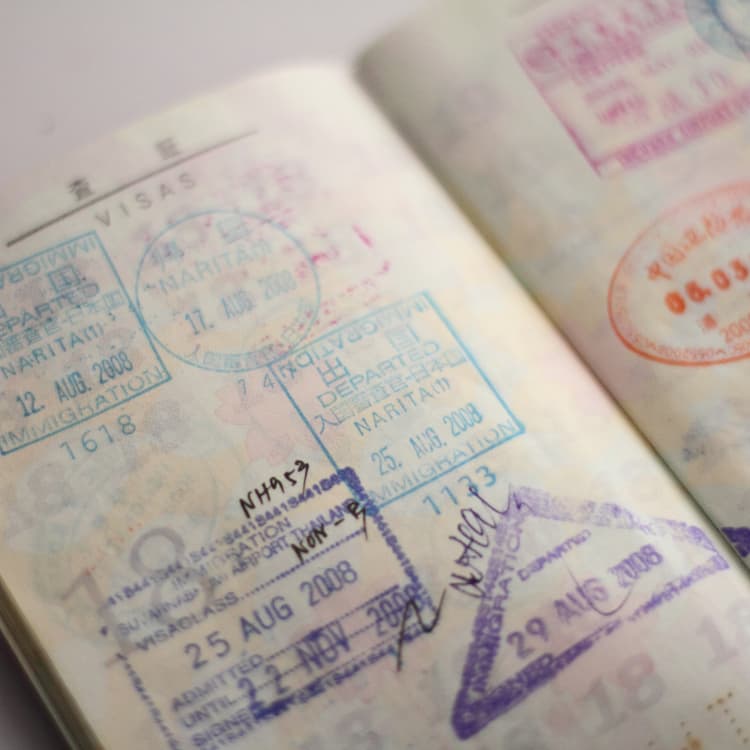
- Helping You Plan
All you need to know about entering, leaving and staying in Japan
Any foreign visitor entering Japan must have a valid passport for the duration of their stay, and all visitors must comply with the conditions of their visas.
See below for information about the current visa requirements for Japan.
If you have any further questions, please contact the Japanese embassy or consulate in your country of residence.
Enjoy the Digital Nomad Lifestyle in Japan
Japan introduced a new visa program specifically for "digital nomads" -international remote workers who are attracting worldwide attention.
Click here for details:
Did this information help you?
out of found this information helpful.
Thank you for your feedback.
Recommended for you.
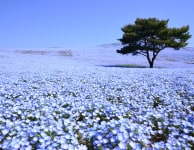
Please Choose Your Language
Browse the JNTO site in one of multiple languages
Ukraine-Russia war latest: Moscow warns US of 'fatal consequences'; Russia suffers more than 1,000 casualties in 24 hours, Ukraine claims
Ukraine's grid operator has imposed daily energy restrictions across the country after critical infrastructure was damaged in Russian attacks. Meanwhile, one person has been killed and others injured in a strike on a recreation centre in the Kharkiv region.
Monday 3 June 2024 12:00, UK

- The big picture: What you need to know about the war right now
- Russia warns US against 'mistakes that may have fatal consequences'
- Moscow's forces 'suffers 1,270 casualties in 24 hours', Ukraine claims
- China hits back at Zelenskyy over summit disruption allegations
- Energy restrictions imposed across Ukraine after wave of Russian attacks
- Deborah Haynes: UK defence chief doubts Russia wants war with NATO
- Live reporting by Guy Birchall
Around 1.5 million men have registered for conscription in Ukraine, the defence ministry has said.
After the new law on mobilisation came into force on 18 May, military-aged men were given 60 days to update their personal data so that the state could locate them.
According to a video posted on the ministry's YouTube channel, the majority of the updates were done on the new Reserve+ online app.
In addition to using the app, Ukrainians can update their data in person at public service centres or enlistment offices.
The ministry added that 14,000 men living abroad across 124 countries had updated their credentials.
Ahead of the 80th anniversary of D-Day, Britain's defence chief Admiral Sir Tony Radakin spoke about the comparisons made between the Second World War and the conflict in Ukraine.
He told Sky News he is confident we are not heading towards another world war and has every faith Ukraine would prevail in its fight.
Admiral Radakin added that by the end of June, 500,000 Russians would have died or been injured in the conflict.
Kazan's airport has imposed temporary flight restrictions for safety reasons today, Russia's aviation watchdog has said.
This is usually done in expectation of Ukrainian drone attacks.
Kazan is the capital of the Russian Republic of Tatarstan and is located about 500 miles east of Moscow.
The region has been repeatedly attacked by drones in recent months, an indication that Ukraine has dramatically improved its ability to strike deep within Russian territory.
Ukraine has claimed the Russian military has suffered 1,270 casualties in the past 24 hours, the Ukrainian general staff said on Monday.
If that toll, released by the Ukrainian general staff this morning, is correct, it would be one of the highest daily Russian casualty figures since the war began.
Kyiv has regularly claimed that Moscow's forces have lost more than 1,000 men a day since Russia launched a new offensive in the Kharkiv region last month.
The Kharkiv region, which borders Russia, and Kharkiv city, the administrative centre of the region, have been battered nearly daily, since the attacks intensified.
The news comes on the heels of last week's decision by President Joe Biden to approve the use of US supplied weapons to hit targets inside Russia that were involved in attacks on Ukraine's Kharkiv region.
Volodymyr Zelenskyy has said Donald Trump risks being a "loser president" if he retakes the White House and imposes a bad peace deal on Ukraine.
The Ukrainian president said he had "no strategy yet" for what to do if Trump wins in November and that Boris Johnson had approached the Republican on his behalf, according to The Guardian.
He said if Trump were re-elected, the Republican could impose a crushing defeat on Ukraine, should he so chose.
It's widely thought Trump may end US military support for Ukraine if he gets into the White House.
"Ukraine, barehanded, without weapons, will not be able to fight a multimillion [Russian] army," Mr Zelenskyy told the paper.
"Does he want to become a loser president?" he said.
"A ceasefire is a trap," he added, saying that after a break in hostilities Vladimir Putin would "go further" and make Trump look "very weak" in the eyes of the world.
Donald Trump has previously claimed he could "end the war in 24 hours".
We're getting more warnings from Russia to the US now.
The foreign ministry told the US not to make any "mistakes that may have fatal consequences" with regards to allowing Ukraine to strike targets on Russian soil, the Interfax news agency reported.
It comes after the foreign ministry earlier warned that Ukraine using Patriot air defence systems in Russia would escalate the conflict.
Beijing has hit back at Volodymyr Zelenskyy after he accused the country of helping Russia disrupt a global peace conference in Switzerland.
China has said it would not be attending the summit because Russia would not be taking part alongside Ukraine.
The Chinese foreign ministry said it believes all efforts should be recognised by all in supporting peace measures around the Russia-Ukraine war.
Beijing has never "fanned fire or fuelled the flames", said ministry spokesperson Mao Ning, addressing a question on the peace summit.
She added that there was "no situation of China exerting pressure on other countries".
In the same press conference, Ms Mao also said China wanted to "deepen oil and gas cooperation with Russia".
Yesterday, speaking at the Shangri-La defence forum in Singapore, Asia's premier security conference, Mr Zelenskyy said China is pressuring other countries and their leaders not to attend the Summit on Peace in Ukraine, scheduled for 15-16 June.
"Russia, using Chinese influence in the region, using Chinese diplomats also, does everything to disrupt the peace summit," he said.
"Regrettably this is unfortunate that such a big independent powerful country as China is an instrument in the hands of Putin."
Russia has said discussions over allowing Ukraine to use Patriot MIM-104 air defence systems over Russian territory show the West is on a "path of escalation".
The state-run TASS news agency cited Moscow's foreign ministry as making the remarks today.
"Russia will take all measures to thwart such threats," the ministry added.
In April, the Pentagon said it would "rush" Patriot air defence missiles and artillery ammunition to Ukraine as part of its new $6bn military aid package.
However, Patriot systems for launching the missiles will not be sent, Defence Secretary Lloyd Austin said at the time.
Volodymyr Zelenskyy has been forthright in saying the weapons are needed urgently and their absence is costing Ukrainian lives.
"Patriot" stands for "Phased Array Tracking Radar to Intercept on Target" and is a long-range, all-altitude, all-weather air defence system designed to counter tactical ballistic missiles, cruise missiles and advanced aircraft.
The American-made missiles are produced by Raytheon in Massachusetts and Lockheed Martin Missiles and Fire Control in Florida.
The system is used by the US and some of its allies, including Germany, Greece, Israel, Japan, Kuwait, the Netherlands, Saudi Arabia, South Korea, Poland, Sweden, Qatar, the United Arab Emirates, Romania, Spain, and Taiwan.
Hungarian foreign minister Peter Szijjarto has said his country has not yet decided whether to join a global peace summit aimed at helping to end the war in Ukraine.
He said that while he respected efforts by Switzerland to achieve peace, he doubted whether the summit made sense if "there aren't both parties to the war" present.
Russia will not attend the summit, which is being held later this month.
Hungary has repeatedly opposed Ukraine's accession to NATO and the EU, sanctions on Russia, undermined Western aid efforts for Ukraine, and maintained close relations with Moscow throughout the full-scale war.
In mid-May, it vetoed a Council of Europe resolution to officially recognise and support Volodymyr Zelenskyy's 10-point peace formula.
"If both sides of the war are not represented, I think it is a legitimate question whether the whole summit makes sense in terms of the ultimate goal, which is to seek peace," Mr Szijjarto said.
"We [Hungary] believe that the peace summit has real meaning and gives the greatest hope for peace if both sides are at the table."
Volodymyr Zelenskyy is making a surprise appearance in the Philippines today, thanking it for its participation in a high-level peace summit later this month.
In their first in-person meeting in Manila, the Ukrainian president thanked President Ferdinand Marcos Jr for his "clear position" on Russia's "occupation of our territories".
"I'm happy to hear today from you that you participate (in) our basic steps to the peace," Mr Zelenskyy told his Philippine counterpart during their bilateral meeting, speaking in English.
He also announced that Ukraine would open an embassy in Manila this year.
Be the first to get Breaking News
Install the Sky News app for free

We’re sorry, this site is currently experiencing technical difficulties. Please try again in a few moments. Exception: request blocked

IMAGES
VIDEO
COMMENTS
If you need after-hours assistance in an emergency, please call 03-3224-5000 and ask to speak with the Embassy's duty officer. Emergency Contact Information for U.S. citizens. Emergency Preparedness for U.S. citizens in Japan. Sources of Help, including counseling services. Medical Assistance in Japan.
Call us in Washington, D.C. at 1-888-407-4747 (toll-free in the United States and Canada) or 1-202-501-4444 (from all other countries) from 8:00 a.m. to 8:00 p.m., Eastern Standard Time, Monday through Friday (except U.S. federal holidays). See the State Department's travel website for the Worldwide Caution and Travel Advisories.
Japan has made agreements to waive visa requirements for tourism with 61 countries and regions. You can find more information about this on the Embassy's visa section page. If you need to obtain a visa for your travels, please contact your nearest Consulate General of Japan or call the Visa Section of the Embassy at 202-238-6800.
Visas for U.S. citizens hoping to travel, study or work in Japan are controlled by the Japanese government. While the Japanese Government is the ultimate authority on visa matters, we would like to present some general information on visas for U.S. citizens to aid in your planning. U.S. citizens without a work visa cannot work in Japan.
If you do NOT need a visa, skip to STEP #6. Prepare all the required documents: Types of Visas & Documents. Visit the Embassy of Japan and submit all the documents: Application Drop-off Hours. Visit the Embassy of Japan to pick up the visa and pay the visa fee: Pick-up/payment Hours & Fees.
-Register relevant information and get QR codes on Visit Japan Web for smooth entry into Japan. QR codes are generated after the registration. *Immigration and Customs procedures on Visit Japan Web are available at 7 major airports (Tokyo/Narita, Tokyo/Haneda, Kansai, Chubu, Fukuoka, New Chitose, Naha). About Visit Japan Web
If you decide to travel to Japan: Enroll in the Smart Traveler Enrollment Program (STEP) to receive Alerts and make it easier to locate you in an emergency. Follow the Department of State on Facebook and Twitter. Follow Embassy Tokyo's American Citizen Services section on Facebook and Twitter. Review the Country Security Report for Japan.
Tourists and business travelers (temporary visitors) If you are a citizen of one of the over 50 countries with which Japan has a "general visa exemption arrangement", you need only a valid passport to enter Japan as a "temporary visitor". Otherwise, you need to obtain a visa before entering the country.
Japan is now open to travelers from all countries or regions. Travelers are required to provide either a valid COVID-19 vaccination certificate (3 doses) of WHO-approved vaccines or a certificate of negative result of pre-departure COVID-19 test conducted within 72 hours prior to departing from the originating country/region.
Emergency Preparedness for U.S. Citizens in Japan. Consular Affairs (CA) is the public face of the Department of State for millions of people around the world. We provide many services, and the most common are listed below.
Before traveling to Japan, US citizens need to ensure they have the necessary travel documents, including a valid passport and a visa. Fortunately, Japan offers a visa waiver program for US citizens, allowing them to stay in the country for up to 90 days without a visa. Here are the key requirements for US citizens:
An official website of the United States government. Here's how you know ... demonstrations, or violent actions against U.S. citizens and interests. Emergency Assistance. Local Emergency Information and Contacts. ... CDC Travel Notice for Japan - Warning Level 3, Avoid Nonessential Travel. By U.S. Mission Japan.
The total number of travelers authorized to enter Japan will decrease from 5,000 to 3,000 starting on December 1, 2021. The U.S. Embassy strongly urges any U.S. citizens considering travel to Japan to carefully review the information available from the Government of Japan.
Inquiries about Visas Application. Foreign Residents Support Center (FRESC) MOFA Visa Information. Yotsuya Tower 13F, 1-6-1 Yotsuya, Shinjuku-ku, Tokyo, 160-0004 Navi-Dial: 0570-011000. (For some IP phones and calls from overseas, please call +81-3-5369-6577) Monday to Friday, 09:00-17:00.
Planning a Trip to Japan? Share your travel photos with us by hashtagging your images with #visitjapanjp. COVID-19: Practical Information for Traveling to Japan Explore and discover with peace of mind. All information here is gathered from the relevant authorities. Due to the regularly changing situation, it is essential for you to always check ...
April 26, 2024. Japanese. Tweet. Foreign nationals/people who wish to travel to Japan for tourism for a short-term period can apply for a visa online and receive an electronic visa (eVISA) through the JAPAN eVISA system. As of April 26, 2024, the JAPAN eVISA system is available for nationals/people residing in the following countries/regions.
For Travelers. Information in case of illness or injury. Official announcements from the Government of Japan. Answers to your questions about traveling to Japan and staying safe during COVID-19, including where to get help if you need it.
Japan Entry Requirements - Required Travel Documents for Travel to Japan. U.S. citizens do not need a visa for stays of 90 days or less for tourism or business in Japan. However, their passports must be valid for the duration of their stay . Visitors may not be employed in Japan while they are on a visa-free stay, and cannot change their visa ...
As of June 10, Japan reopened to travelers from 98 countries, including the United States, but with a whole host of specific conditions—including the need for a visa. Prior to closing its international borders in 2020 due to the pandemic, Japan had exempted U.S. travelers from the need to obtain a visa for entering the country for leisure travel.
Travel during daylight hours only, especially in rural areas. If you choose to drive a vehicle in Japan, learn the local traffic laws and have the proper paperwork. Get any driving permits and insurance you may need. Get an International Driving Permit (IDP). Carry the IDP and a US-issued driver's license at all times.
Any foreign visitor entering Japan must have a valid passport for the duration of their stay, and all visitors must comply with the conditions of their visas. See below for information about the current visa requirements for Japan. Visa Information. If you have any further questions, please contact the Japanese embassy or consulate in your ...
Ukraine's grid operator has imposed daily energy restrictions across the country after critical infrastructure was damaged in Russian attacks over the weekend. Meanwhile, one person has been ...
SEE MORE. Treaty Trader and Treaty Investor Visas. Treaty Trader (E-1) and Treaty Investor (E-2) visas are available for citizens of countries with which the United States maintains treaties of commerce and navigation, including Japan, who work for companies that trade or invest in the United States. SEE MORE.
U.S. citizens in Japan should carefully track typhoons that may impact their area and should follow all local government emergency guidance. In the past, U.S. citizens have been stranded and forced to delay travel (including return travel to the United States) due to infrastructure damage to airports, limited flight availability, suspension of ...